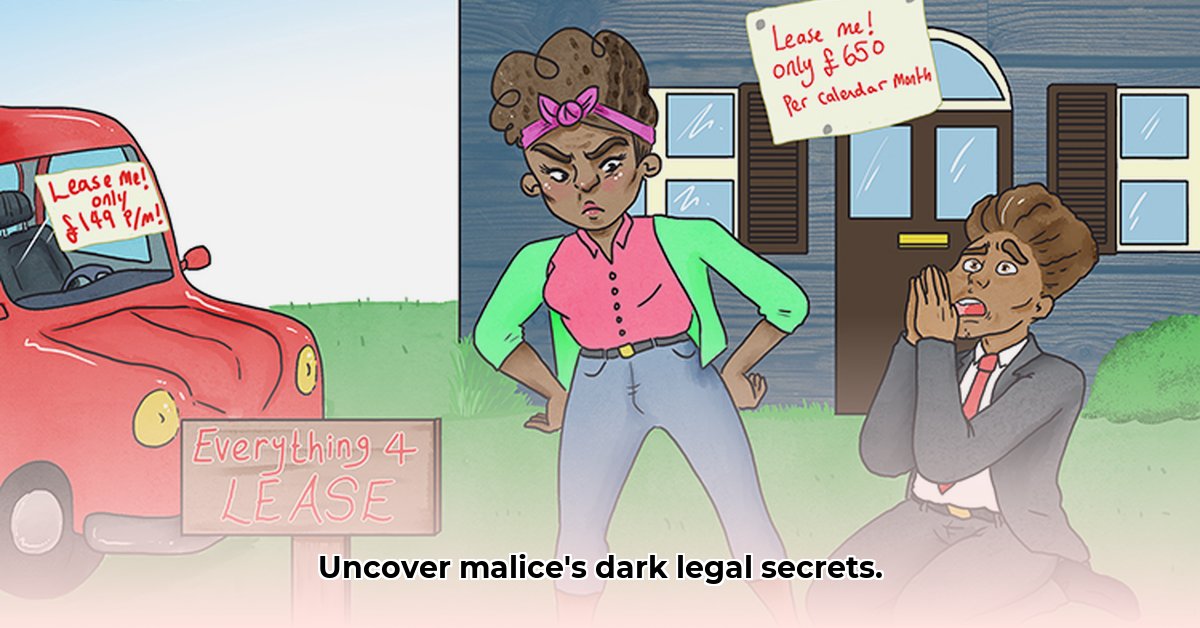
Unpacking the Legal Jargon of Malice
We all understand malice in everyday conversation – acting with spite or ill-will. But in law, "malice" transcends mere nastiness; it's a precisely defined legal term with serious repercussions. It's not enough to feel malicious; one must demonstrate it legally. This article deconstructs the legal meaning of malice, exploring its variations across jurisdictions and highlighting its significance in legal proceedings. We'll examine real-world examples and strategies for addressing malice claims, aiming for accessibility for both legal professionals and the general public.
Intent: The Cornerstone of Malice
Determining malice fundamentally hinges on intent. Did the individual intend to cause harm? This is where complexities arise. Legal systems grapple with this, differentiating between subjective intent (what the person actually thought and planned) and objective intent (what a reasonable person would have anticipated). This distinction significantly impacts case outcomes.
Consider two drivers: one slams on brakes unexpectedly, causing a pile-up, while the other deliberately swerves to hit another car. Both caused accidents, but only the second driver demonstrably intended harm. This difference in intent—the presence or absence of malice—is pivotal in determining culpability and sentencing. Isn't it interesting how such a subtle difference in intent can drastically alter legal outcomes?
Express vs. Implied Malice: A Crucial Distinction
Further complicating matters is the distinction between "express malice" and "implied malice." Express malice is straightforward – a clear and overt intention to harm or kill (e.g., premeditated murder). Implied malice, however, is more nuanced. It involves extreme recklessness, demonstrating a blatant disregard for others' safety, even without specific intent to cause harm. Someone firing a gun into a crowded room illustrates this – no specific target, yet an obvious disregard for human life. This distinction radically influences charges and potential sentences. How frequently do you think implied malice cases arise in South African courts?
Malice: A Jurisdictional Perspective
The legal definition of malice isn't universally consistent. Common law systems, like South Africa's, rely on precedent and legal tradition; civil law systems might have specific statutory definitions. This creates complexities in international legal cases, underscoring the need for jurisdiction-specific legal expertise.
Proving Malice: A Challenging Endeavour
Proving malice in court is demanding. Prosecutors require compelling evidence to convince a judge or jury of malicious intent. This often involves circumstantial evidence – witness testimonies, text messages, the accused's actions before and after the event. Even without a confession, sufficient evidence might establish malice beyond a reasonable doubt. The court considers the entire context.
The Broader Implications of Malice
The consequences of establishing malice extend beyond criminal cases. In civil lawsuits, proving malice can significantly increase damages. Consider someone writing a defamatory article – proving malice increases potential payouts substantially.
Real-World Examples of Malice
Let's explore common scenarios where malice plays a critical role:
Murder: Malice aforethought (premeditation) is central to murder charges, implying a deliberate killing, not a spontaneous act of violence.
Assault: A simple assault becomes aggravated assault if malice is proven, leading to a more severe charge and penalty.
Defamation: In libel or slander cases, establishing malice enhances damages awarded to the victim.
How to Prove Malice in a South African Defamation Lawsuit
Key Takeaways:
- Defamation in South Africa is a civil wrong, not a criminal offence, except in extreme cases.
- Proving malice is crucial for a successful defamation claim, moving beyond mere negligence.
- Evidence must show the defendant acted with ill-will, knowing the statement's falsity, or recklessly disregarding its truth—a critical difference.
- Strong legal representation is paramount in navigating the intricacies of defamation law.
- Successful cases usually involve substantial evidence and expert legal counsel.
Understanding Malice in the Context of Defamation
Proving defamation in South Africa requires demonstrating an untrue statement causing reputational harm. Malice, however, is often the key to securing a substantial settlement. It requires demonstrating the defendant acted with ill will – not just negligence, but a deliberate attempt to damage reputation. It's the difference between accidental and intentional harm.
Evidentiary Requirements for Proving Malice
Proving ill will necessitates strong evidence, including:
- Past Conflicts: A history of disputes could suggest a motive for malicious behaviour.
- Fabricated Claims: Deliberate distortion of facts or creation of falsehoods points to intent to harm.
- Lack of Investigation: Failure to verify statements despite contradictory evidence demonstrates reckless disregard for the truth.
- Admissions: A defendant's admission of malicious intent is the strongest evidence.
- Circumstantial Evidence: Patterns of behaviour suggesting malice can be persuasive.
The court holistically assesses evidence to determine if the defendant acted maliciously.
The Essential Role of Legal Counsel
Navigating defamation law requires expert legal representation. A lawyer guides the process, helps gather evidence, and presents a strong case. Successfully proving malice is not a DIY project.